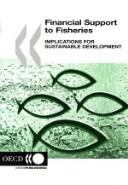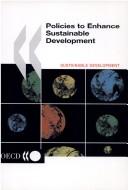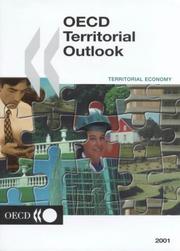| Listing 1 - 8 of 8 |
Sort by
|

ISBN: 9264154876 9264174281 9789264154872 Year: 1998 Publisher: Paris : OECD Publishing,
Abstract | Keywords | Export | Availability | Bookmark
 Loading...
Loading...Choose an application
- Reference Manager
- EndNote
- RefWorks (Direct export to RefWorks)
Since the Rio Earth Summit in 1992, sustainability has emerged as an over-arching policy goal in the OECD Secretariat and in its Member countries. Real progress depends upon the integration of environmental and social goals with economic ones. This publication provides an overview and analysis of trends and identifies policy gaps and trade-offs that have been encountered and points to future options. The authors document positive trends which have emerged signalling greater sustainability, as well as areas where progress has proved more elusive. While the main focus is the OECD region, expanding linkages -- among all countries and regions -- form an important part of the story. The coverage of the volume reflects the OECD's diverse subject matter expertise, and some of the interdisciplinary synergies that the Organisation can generate. Part I of this two-part volume concentrates on socio-economic issues, including the integration of economics and environment; trade and environment; changing consumption and production patterns; assessing environmental performance; development co-operation; and the evolution of aid agencies since Rio. Part II takes an in-depth look at nine sectoral issues: energy; transport; agriculture; toxic chemicals; climate change; nuclear energy; urbanisation; biotechnology; and education. In short, this publication gives essential keys to meet the major challengeof the 21st century: helping to make sustainability a reality.
Sustainable development --- Environmental policy --- Economic aspects --- Environmental Sciences and Forestry. Environmental Management --- Environmental Policy --- Environmental Policy. --- Economics --- Environment --- Economic History --- Business & Economics --- Development, Sustainable --- Ecologically sustainable development --- Economic development, Sustainable --- Economic sustainability --- ESD (Ecologically sustainable development) --- Smart growth --- Sustainable economic development --- Economic development --- Environmental aspects --- Sustainable development - OECD countries. --- Environmental policy - Economic aspects - OECD countries.
Book
ISBN: 1282451855 9786612451850 9264076522 9264076514 Year: 2009 Publisher: Paris : OECD,
Abstract | Keywords | Export | Availability | Bookmark
 Loading...
Loading...Choose an application
- Reference Manager
- EndNote
- RefWorks (Direct export to RefWorks)
Why do some regions grow faster than others, and in ways that do not always conform to economic theory? This is a central issue in today’s economic climate, when policy makers are looking for ways to stimulate new and sustainable growth. OECD work suggests that there is no one-size-fits-all answer to regional growth policy. Rather, regions grow in very varied ways and the simple concentration of resources in a place is not sufficient for long-term growth. This report draws on OECD analysis of regional data (including where growth happens, country-by-country), policy reviews and case studies. It argues that it is how investments are made, regional assets used and synergies exploited that can make the difference. Public investment should prioritise longer-term impacts on productivity growth and combine measures in an integrated way. This suggests an important role for regional policies in shaping growth and economic recovery policies, but also challenges policy makers to implement policy reforms.
OECD countries - Economic conditions. --- OECD countries - Economic policy. --- Sustainable development -- Government policy -- OECD countries. --- Sustainable development -- OECD countries. --- Sustainable development --- Business & Economics --- Economic History --- Government policy --- OECD countries --- Economic conditions. --- Economic policy. --- Development, Sustainable --- Ecologically sustainable development --- Economic development, Sustainable --- Economic sustainability --- ESD (Ecologically sustainable development) --- Smart growth --- Sustainable economic development --- Environmental aspects --- Economic development
Book
ISBN: 1282103172 9786612103179 9264056114 9264055827 Year: 2009 Publisher: Paris : OECD,
Abstract | Keywords | Export | Availability | Bookmark
 Loading...
Loading...Choose an application
- Reference Manager
- EndNote
- RefWorks (Direct export to RefWorks)
Well over one-third of the total economic output of OECD countries was generated by just 10% of OECD regions in 2005. This means the performance of regional economies and the effectiveness of regional policy matter more than ever. OECD Regions at a Glance is the one-stop guide for understanding regional competitiveness and performance, providing comparative statistical information at the sub-national level, graphs and maps. It identifies new ways that regions can increase their capacity to exploit local factors, mobilise resources and link with other regions. Measuring such factors as educatio
Economic development -- Periodicals. --- OECD countries -- Economic conditions -- Periodicals. --- OECD countries -- Economic conditions. --- OECD countries -- Social conditions -- Periodicals. --- OECD countries -- Social conditions. --- Sustainable development -- OECD countries -- Periodicals. --- OECD countries --- Economic conditions. --- Social conditions. --- OECD member countries --- Organisation for Economic Co-operation and Development countries

ISBN: 1280607491 9786610607495 9264036644 9264036636 Year: 2006 Publisher: Paris : OECD,
Abstract | Keywords | Export | Availability | Bookmark
 Loading...
Loading...Choose an application
- Reference Manager
- EndNote
- RefWorks (Direct export to RefWorks)
OECD governments pay out around USD 6 billion a year to support the fisheries sector. Some of this expenditure is provided to help ensure the effective management of fisheries through the provision of research, administrative and enforcement services. However, its effects on economic profitability and resource sustainability are open to debate. Such support has often been linked to over-fishing and over-capitalisation, and its reform may lead to improved economic, environmental and social outcomes. This report analyses the impacts of such transfers from a sustainable development perspective by addressing the economic, environmental and social dimensions of financial transfers. Through this innovative focus, this study will deepen policy makers’ understanding of the complex issues at play in the fisheries sector — a sector that is characterised by ongoing concerns regarding economic profitability, community resilience, and resource sustainability.
Fisheries -- Economic aspects -- OECD countries. --- Fisheries -- Economic aspects. --- Fishery policy -- Economic aspects -- OECD countries. --- Fishery policy -- Environmental aspects -- OECD countries. --- Fishery policy -- Social aspects -- OECD countries. --- Sustainable development -- OECD countries. --- Fisheries --- Agriculture --- Earth & Environmental Sciences --- Animal Sciences --- Economic aspects --- Economic aspects. --- Fishery economics
Book
ISBN: 9264079688 926407967X Year: 2010 Publisher: Paris : OCDE,
Abstract | Keywords | Export | Availability | Bookmark
 Loading...
Loading...Choose an application
- Reference Manager
- EndNote
- RefWorks (Direct export to RefWorks)
Les marchés des biens et services ont beaucoup changé au cours des 20 dernières années. Les réformes des régulations, les marchés internationaux, de nouvelles technologies, et un rôle plus proéminent des services dans l’activité économique – tout cela a servi de moteur à des changements bien souvent bénéfiques pour les consommateurs. La variété et la complexité accrue de nombreux marchés font qu’il est de plus en plus difficile de comparer et de déterminer la valeur des biens et services. Les défis auxquels font face les consommateurs ont créé des défis similaires pour les autorités gouvernementales chargées de les protéger contre la fraude et les pratiques commerciales injustes. Cet ouvrage se penche sur l’évolution des marchés et donne un aperçu des améliorations possibles dans le domaine des politiques de consommation. Il étudie, pour la première fois, comment l’étude de l’économie du comportement est en train de transformer la manière dont les décideurs politiques abordent différents problèmes.
Consumers -- OECD countries. --- Consumption (Economics) -- OECD countries. --- Electronic books. -- local. --- Sustainable development -- OECD countries. --- Consumption (Economics) --- Sustainable development --- Consumers --- Customers (Consumers) --- Shoppers --- Development, Sustainable --- Ecologically sustainable development --- Economic development, Sustainable --- Economic sustainability --- ESD (Ecologically sustainable development) --- Smart growth --- Sustainable economic development --- Consumer demand --- Consumer spending --- Consumerism --- Spending, Consumer --- Environmental aspects --- Persons --- Economic development --- Demand (Economic theory)

ISBN: 1280082909 9786610082902 9264192689 9264186611 Year: 2001 Publisher: Paris : OECD Publishing,
Abstract | Keywords | Export | Availability | Bookmark
 Loading...
Loading...Choose an application
- Reference Manager
- EndNote
- RefWorks (Direct export to RefWorks)
Sustainable development involves linking the economic, social and environmental objectives of societies in a balanced way. It stresses the importance of taking a broader view of what human welfare entails, of using a long-term perspective about the consequences of today's activities, and of recognising the global nature of many of the most pressing challenges facing societies. OECD countries committed themselves to sustainable development at the 1992 Rio Conference on Environment and Development. However, action to meet these commitments remains slow. This report identifies some of the main barriers -- conceptual and practical -- that stand in the way of progress, and some of the areas where concrete government actions will allow a better integration of environmental, economic and social goals. Particular focus is placed on how the use of the price system, reform of governments' decision-making processes, technology policies, and international trade and investment may each contribute to removing incentives to unsustainable resource depletion and environmental degradation. Recommendations in each of these areas are presented in this Report, and then applied to two areas -- climate change and natural resource management -- where the risks of non-sustainability appear to be highest.
Economic development -- Environmental aspects. --- OECD countries -- Economic policy. --- Sustainable development -- OECD countries. --- Sustainable development --- Business & Economics --- Economic History --- Development, Sustainable --- Ecologically sustainable development --- Economic development, Sustainable --- Economic sustainability --- ESD (Ecologically sustainable development) --- Smart growth --- Sustainable economic development --- Environmental aspects --- Economic development

ISBN: 128008281X 9786610082810 9264189912 9264186026 Year: 2001 Publisher: Paris : OECD Publishing,
Abstract | Keywords | Export | Availability | Bookmark
 Loading...
Loading...Choose an application
- Reference Manager
- EndNote
- RefWorks (Direct export to RefWorks)
This first edition of the OECD Territorial Outlook examines policy developments in the areas of urban, rural and regional affairs in OECD countries. It explains why territorial policies matter and shows how diverse OECD countries can be. It examines such issues as sustainable development, metropolitan governance, and such policy devices as business incubators and enterprise clusters. The book closes with a survey of territorial policy trends in 15 OECD countries. Data are provided for geographic distribution of population and income per capita by region for OECD countries.
Economic development -- Periodicals. --- OECD countries -- Economic conditions -- Periodicals. --- Regional planning -- OECD countries -- Periodicals. --- Sustainable development -- OECD countries -- Periodicals. --- Regional planning --- Sustainable development --- Economic development --- OECD countries --- Economic conditions --- Development, Sustainable --- Ecologically sustainable development --- Economic development, Sustainable --- Economic sustainability --- ESD (Ecologically sustainable development) --- Smart growth --- Sustainable economic development --- Regional development --- State planning --- Human settlements --- Land use --- Planning --- City planning --- Landscape protection --- Environmental aspects --- Government policy --- OECD member countries --- Organisation for Economic Co-operation and Development countries

ISBN: 1280171588 9786610171583 9264015329 9264015302 Year: 2004 Publisher: Paris : OECD Publishing,
Abstract | Keywords | Export | Availability | Bookmark
 Loading...
Loading...Choose an application
- Reference Manager
- EndNote
- RefWorks (Direct export to RefWorks)
New forms of governance are emerging. Government, business and civil society are increasingly seeking ways to develop and pursue economic development strategies and solve socio-economic problems jointly. Regional strategic platforms, partnerships, open governments and other agents of change help release the potential of their area thanks to better co-ordination, and adaptation of public policies to local conditions. This book examines how the new forms of governance overcome administrative, political and financial obstacles and impact local prosperity and the quality of life. These new approaches are illustrated with the results of some of the ambitious initiatives taken by Belgium, the Czech Republic, Mexico, Norway, Slovenia, Spain and Sweden.
Decentralization in government -- OECD countries. --- Economic development -- Political aspects -- OECD countries. --- Local Economic and Employment Development (Program). --- Local government -- OECD countries. --- Regional planning -- OECD countries. --- Sustainable development -- OECD countries. --- Regional planning --- Local government --- Sustainable development --- Decentralization in government --- Economic development --- Political aspects --- Local Economic and Employment Development (Program) --- Development, Economic --- Economic growth --- Growth, Economic --- Economic policy --- Economics --- Statics and dynamics (Social sciences) --- Development economics --- Resource curse --- Centralization in government --- Devolution in government --- Government centralization --- Government decentralization --- Government devolution --- Political science --- Central-local government relations --- Federal government --- Public administration --- Development, Sustainable --- Ecologically sustainable development --- Economic development, Sustainable --- Economic sustainability --- ESD (Ecologically sustainable development) --- Smart growth --- Sustainable economic development --- Local administration --- Township government --- Subnational governments --- Administrative and political divisions --- Regional development --- State planning --- Human settlements --- Land use --- Planning --- City planning --- Landscape protection --- Environmental aspects --- Government policy --- LEED Programme --- Organisation for Economic Co-operation and Development. --- OECD LEED Programme --- Local Economic and Employment Development Programme --- Local Initiatives for Employment Creation (Program)
| Listing 1 - 8 of 8 |
Sort by
|

 Search
Search Feedback
Feedback About UniCat
About UniCat  Help
Help News
News